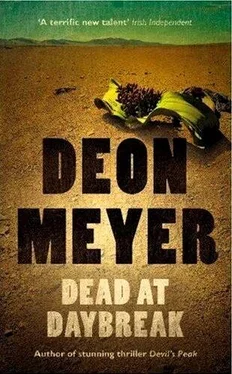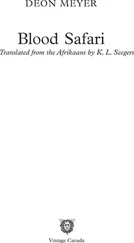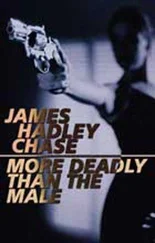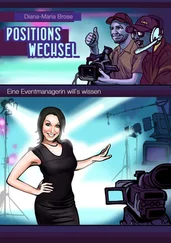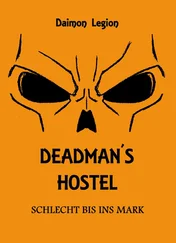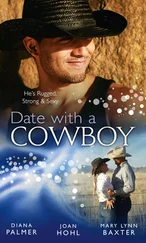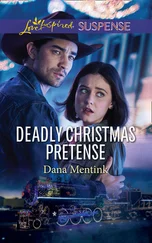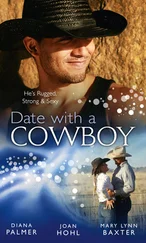“Where to?”
“With someone. Take someone out. There are so many attractive young – ”
“No,” he said.
“What’s her name?”
“Whose?”
“The attorney.”
“Hope Beneke.”
“Is she pretty?”
“What does that matter?”
“I just wondered.” She put her empty glass down and slowly stood up. “I must get home.”
He pushed his chair back, stretched out an arm for her raincoat, held it for her, picked up her umbrella.
“Thank you, Zet.”
“It was a pleasure.”
“Good night.”
He opened the door for her.
“Night, Ma.”
∨ Dead at Daybreak ∧
DAY 6
FRIDAY, JULY 7
∨ Dead at Daybreak ∧
8
When I was nine, or eight or ten, somewhere during those forgettable, neither-fish-nor-fowl years, I took part in a rugby game, playing on the rock-hard field of the Stilfontein Primary School. During the typical ruck ’n tumble of little boys, I received a blow that made my nose bleed. The referee, a teacher I think, came up to me.
“Now, now, my boy, men don’t cry,” he said comfortingly.
“No.” My mother’s voice was clearly audible next to me. She was angry. “Cry, my child. Cry as much as you like. Men are allowed to cry. Real men may cry.”
When I think back, it was typical of who she was and how she tried to raise me.
Different. From Stilfontein and its people and their views and way of doing things.
Describing the psyche of a mining town is difficult because one has to generalize. Young Afrikaners with a minimal education and a maximum income made for a heady, combustible mixture. They lived their lives in the fast track – they earned fast and spent fast on fast cars, bikes, and women. Their alcohol intake, their tempers – everything matched the speed of potential sudden death in the dark depths of the earth.
And amid all this was the cultural oasis of Joan van Heerden’s home.
The mine gave her, us, a smaller house in Stilfontein. I don’t know why she didn’t move to Pretoria: her parents and her friends were there. I suspected that it was because she wanted to be near my father, near his grave in the gray cemetery in the windblown wasteland on the back road to Klerksdorp.
There was no shortage of money. Life insurance was fashionable among Afrikaners in those days. And my father was provident unto death. But income also came from my mother, whose paintings began selling slowly but steadily, the prices rising a little each year, each year an exhibition at a larger, more important gallery.
Perhaps her decision to remain in Stilfontein was partly a desire to stay away from the mainstream of art – she disliked the pretentiousness of so-called art lovers and critics. And then there were the arty types, peculiar people who believed that exotic clothing and strange hairstyles would guarantee their admission into the inner circle of taste – all they needed to do was to act bohemian and cultured. She couldn’t stand them.
So it was just the two of us and Stilfontein. There were a few friends in the town – Dr. de Korte, our GP, and his wife, the Van der Walts of the framing shop – and people from Johannesburg and Potchefstroom who came on visits over weekends.
Placid and uneventful years of growing up. Until my sixteenth year.
My mother had no other men in her life except for the husbands of her friends – and the gay men in the art world, like Tony Masarakis, the Greek sculptor in Krugersdorp who sometimes dropped in. When I was nine or ten he mentioned in passing that she had a good-looking son. “Forget it, Tony,” she had said with finality. He must have taken it to heart because they remained friends for many years.
She was a young widow, in her late twenties. And beautiful. A passionate woman. Would she be celibate for the rest of her life? I never thought about it until I reached my own twenties, and then, when I did think about it, it was with a qualm. Because after all, she was my mother and I was Afrikaans.
I don’t know if she occasionally sought relief, let alone found it. If so, it was done with the utmost discretion and possibly with the strict injunction to her partner (or partners) of no long relationships, thank you. Perhaps during those weekends when she went to exhibitions in the Cape, or in Durban or Johannesburg, and I didn’t go with her.
But there was no evidence.
The question, of course, was whether growing up without a father, without a male role model, scarred a boy whose mother had called him Zet from an early age. I would so much have liked to embrace it as an exoneration, make it part of the greater exoneration, for the compelling wave that eventually spilled me over the edge, dish it up as an easy psychological escape hatch for the fuckup of my life. But I don’t think I can. My mother raised me with ease and patience. Treated me with respect and compassion and discipline, loved me, punished me, and cared for me – even if our staple food, when no friends were visiting, was fruit and bread. She played Beethoven, Schubert, Haydn, and Bach (J. S. and, to a lesser extent, C.P. E.) without forcing the music down my throat and later, when I wanted to listen to Bachman Turner Overdrive and Black Sabbath, even kept her music in the background. I suspected that she knew which music would stay with me in the long run.
Those were safe years. Until I was sixteen. When I discovered Mozart and books and food and sex and the long arm of the law.
∨ Dead at Daybreak ∧
9
He was awake long before the alarm went off at five o’clock. He lay in the dark, staring at the ceiling, and waited for the instrument’s electronic beep. He killed it, swung his legs off the bed, checked the pain in his body. The ribs hurt a little less, but the eye still throbbed. He knew it would turn purple during the morning. It wasn’t his first.
He walked to the kitchen. The crockery was neatly stacked in the drying rack. He put the kettle on. The cold penetrated the worn old police tracksuit. He put instant coffee into a mug, waited for the water to boil, poured it onto the grains, added milk, walked to the combined dining and living area, put the coffee on the small table. Looked for the CD he wanted. Clarinet Concerto. Pressed the buttons on the portable stereo, put on earphones, sat down, drank a mouthful of coffee. Adjusted the volume.
He had known since the previous day that he would have to think about Nagel. Since that moment in the attorney’s office. We…Nagel and I caught a rapist who preyed on kids , he had wanted to say.
It was because this reminded him so much of what he used to do. The first time…the first time since he had left. The first time since then that he was looking for a murderer again. That was why he would think about Nagel. It was normal. He simply had to be careful. He could think about Nagel, about everything Nagel had taught him. He just had to stay within those bounds. Then he would be safe. Set the parameters now. Then he could carry on.
Jan Smit.
Play all the angles : Nagel of the deep bass voice, the bobbing Adam’s apple, Nagel who couldn’t speak English to save his life. Murder case is like my fuckin’ Portapool, Van Heerden. Even if everything looks blue and refreshing, even if the sun glitters on the water, somewhere there’s a fucking leak. We’ll find it if we look everywhere .
He wrote in the notebook.
1. Neighbors.
He sat back, thought again, wrote.
2. Manie Meiring Transport.
3. What kind of company?
4. Registrar of Companies (referrals) (??)
5. Dept. of Home Affairs (??)
He leaned back and swallowed some coffee. Were there other angles?
Читать дальше
